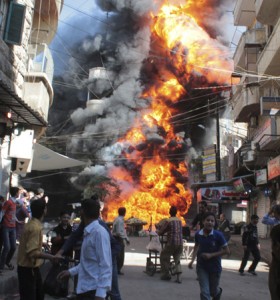Opinion Piece: Middle East conflicts stem from centuries-old rift
 Sunni insurgents sweeping through Iraq as Shia militias mobilise against them; the Syrian conflict reaching new heights of brutality and Australian journalist Peter Greste jailed for seven years in Egypt on charges no one, including the prosecutors, has any clue about.
Sunni insurgents sweeping through Iraq as Shia militias mobilise against them; the Syrian conflict reaching new heights of brutality and Australian journalist Peter Greste jailed for seven years in Egypt on charges no one, including the prosecutors, has any clue about.
So, the Middle East is again squarely the focus of world affairs and source of most of the world’s 50 million refugees and displaced persons.
These events can all be sheeted home to the byzantine web of intrigue, self-interest and overlaid geo-political imperatives – not least of which is oil production – that make up the Middle-East.
Rifts and divisions so deep and intense have opened in the Arab world that it is difficult to know how things will ultimately play out.
At the heart of things is the small but incredibly rich state of Qatar, the larger and even wealthier state of Saudi Arabia, the strife-torn nation of Syria and the enigmatic nation of Iran.
Qatar is where news network Al Jazeera, Greste’s employer, is headquartered. Qatar is a supporter of the Muslim Brotherhood and its leader Mohammad Morsi which – until it was ousted by a military coup led by newly installed current Egyptian President Abdel Fatteh el-Sisi – held power in the Arab world’s most populous country.
It has provided refuge for leading Muslim Brotherhood figures as well as leaders from Hamas and the Taliban.
Meanwhile President el-Sisi is supported by Saudi Arabia in his crackdown on the Muslim Brotherhood and in his hatred for Qatar and Al Jazeera.
The Saudis have supported the new Egyptian regime financially, pledging $12 billion in aid; and, King Abdullah became the first foreign head of state to visit Cairo after Mr el-Sisi was sworn in.
Conversely, the ruling al-Thani family of Qatar provided Mr Morsi with $8 billion in aid when he was in power.
The Saudis regard the Muslim Brotherhood as a terrorist organisation and believe Al Jazeera is its mouthpiece. They closed the network’s Saudi office as the Egyptians have recently done in Cairo.
Strained relations between Saudi Arabia and Qatar go back almost 20 years and observers say that at the heart of this is a divergence on the nexus of politics and Islam.
The Muslim Brotherhood has combined Islam with the ballot box and the Saudis see this as a threat to their status-quo – a threat taken much more seriously since the so-called ‘Arab Spring’ – which saw a wave of protests against repression and despotic rule across the Arab world from Algeria to Palestine.
The Qataris see support for the Muslim Brotherhood as insurance against religiously inspired agitation within Qatar.
This rift is behind the sentence handed down to Peter Greste and is emblematic of other divisions in the Arab world.
The horrors of the conflicts in Syria and neighbouring Iraq, where Sunni insurgents – who call themselves ISIS (Islamic State of Iraq and Syria) and who this week declared a ‘Caliphate’ in the parts of Syria and Iraq they control, and are also said to have executed thousands of captured soldiers and officials, show how brutal the divide is between Sunni and Shi’ite.
But another rift running through the region is the result of a dispute between two very modern but also very fundamentalist interpretations of Islam held by two of the region’s most powerful countries.
On each side of this rift are Saudi Arabia and Iran – each backing different sides of a proxy war being played out in Egypt, Syria and Iraq.
In Iraq, the Sunni insurgents are Wahhabis, a fundamentalist sect with its origins in Saudi Arabia, and they have support from many people, including within government and military circles in Saudi Arabia.
Iran, as the largest Shia-dominated country in the region, can be expected to back the Shia militias as they assemble to face their enemies.
The divide between the Sunni and Shiite branches of Islam is 1400 years old.
In Syria, a Sunni-majority country dominated by members of a Shi’ite sect, fighting that began as anti-government has now taken on a decidedly sectarian tinge.
The conflict there has spilled over into Iraq, which is Shi’ite majority and has a predominantly Shi’ite government but is now under threat from Sunni rebels.
But things are even more complicated. The US and other western nations have castigated the ruling Assad regime in Syria for its brutal crackdown against dissent – which originally came from pro-democracy groups within Syria.
But the fight against the Assad regime has been hijacked by ISIS. Now, paradoxically, the West is opposed to the Assad regime, which is fighting ISIS insurgents. The West is also opposed to ISIS in Iraq where it is helping the government there repel the insurgents.
The Iranians have long been supporters of the Assad regime but seem to have become tacit allies of the West in a bid to stop ISIS fulfilling its plan to establish a medieval-style fundamentalist ‘Caliphate’ across a significant and expanding portion of the Middle East.
Little has changed in the Middle-East in centuries where a fragmented patchwork of alliances and religious differences are at the root of civic chaos and as the region’s major powers continue to push their own strategic and sectarian interests; with Shi’ite majority Iran on one side and Sunni majority Saudi Arabia on the other.
As these power plays unfold there seems little thought by the men in charge who pull the strings for the plight of millions whose homes are being destroyed and whose lives are being shattered – or worse.












